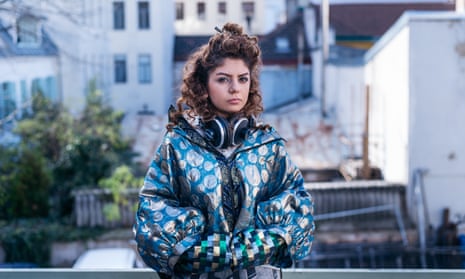Ten years ago Bahman Ghobadi’s film No One Knows About Persian Cats followed a young Iranian songwriting duo’s efforts to form a band with other underground musicians in Iran. It presented a country in which music deemed politically or culturally incendiary was prohibited, since artists hoping to perform or distribute their work had to acquire permission from the Iranian ministry of culture and Islamic guidance, or risk arrest.
The Guardian’s product and service reviews are independent and are in no way influenced by any advertiser or commercial initiative. We will earn a commission from the retailer if you buy something through an affiliate link. Learn more.
Western journalists seized upon a narrative of sensitive outlaws holed up in underground studios, but today a new story is emerging: of a visionary music community now able to openly share its strange creations. Increasingly, Iran is becoming recognised as a hub for some of the world’s most vital, forward-thinking experimental music.
Its affable prime mover is Ata Ebtekar, a long-celebrated figure in electronic music under his alias Sote, meaning “sound” in Farsi. His last album, 2017’s Sacred Horror in Design, received widespread acclaim for its haunting, challenging fusion of electronics with Iranian classical music; this year he will release a new electroacoustic album entitled Parallel Persia, led by the breathtaking single Artificial Neutrality.
His first attempt to break Iran’s electronic music out of the country in the mid-2000s was unsuccessful: “There weren’t any activities in the field of experimental electronic music to be found from the young generation yet,” he explains. However, he returned in 2013 to find things had shifted. The Iranian government’s strictures on music had relaxed, and there were a few fledgling experimental producers; his new friends Siâvash Amini, Hessâm Ohadi and Nimâ Pourkarimi had already created the electronic record Spotty Surfaces. “I could share my goals and vision with a number of people, and act as a group”, he says. Together, they founded SET festival in 2015, where Iranians could watch dazzling audiovisual performances and dance to groundbreaking electronica. While this required many hard-won government permissions, the festival is entirely legal. Moreover, it has sold out every year.
With his new record label Zabte Sote, Ebtekar aims to present Iran’s emergent avant-garde to the world. Its inaugural release, last year’s Girih: Iranian Sound Artists, compiled songs from 40 projects. “It’s pretty impossible to produce physical-format releases in Iran and ship them internationally,” he explains. However, by teaming up with UK label Opal Tapes, Girih has been distributed all over the world – excluding Iran, where he hopes to one day finally release the album.
This article includes content provided by Bandcamp. We ask for your permission before anything is loaded, as they may be using cookies and other technologies. To view this content, click 'Allow and continue'.
Girih, featuring established composers alongside Ebtekar’s students, is remarkably eclectic, from the bludgeoning noise of Tegh’s Selected Narratives to Aso Kohzadi’s gorgeous electroacoustic piece Neyrizaan. All aspects of the compilation were handled by Iranian artists, from the packaging to the mastering, “taking matters in their own hands” according to Ebtekar.
Someone else who had to do this was Mahdyar Aghajani, whose career began in the 2000s when Iran’s music was more heavily restricted. At just 16, Mahdyar gained prominence for producing The Asphalt Jungle, by Hichkas, in 2006. It was the first ever Iranian hip-hop album. Imbuing conventional hip-hop with elements from traditional Iranian music, it was a genuine landmark. However, with hip-hop banned, the record was not submitted for the required permissions. Instead, its release had to be conducted through secret drop-offs, during which Hichkas was arrested and questioned about his producer.
“He told them I was this 30-year-old guy outside of Iran – he sent them totally in the wrong direction,” Mahdyar explains. “Nobody knew my last name or had my picture, they only knew my first name.” This all changed after he appeared in a panel discussion on hip-hop held by an Iranian cultural magazine. While defending the genre to figures from jazz and classical music, he revealed himself to be Asphalt Jungle’s producer, leading him to be hounded by the authorities and blacklisted by the ministry of culture. He was granted a visa for a French press tour after No One Knows About Persian Cats was acclaimed at Cannes film festival, which he used to flee Iran.
While Ebtekar’s circle were quietly popularising experimental music in an increasingly relaxed Iran, Mahdyar was accepting commissions from his new base in Paris. During this time, he frequently had ideas that were “too weird for those projects, but which I personally felt a deep connection with”. For many years, these ideas were only shared with close friends, such as his fellow Iranian sonic pioneer in exile, Ash Koosha. Koosha’s own creations have included VR sound-sculptures and a virtual singer-songwriter called Yona, who writes pop songs using artificial intelligence.
Encouraged, Mahdyar finally released these ideas on his critically acclaimed debut album Seized: a dazzling concoction of abstract hip-hop beats, classical instrumentation and manipulated vocals. Many sounds were drawn from an enormous “cherished” archive he keeps of old recordings, with Vow reworking a 2006 recording of the traditional singer Bidad. When I asked about Seized’s reception among his Iranian fanbase, who know him for producing hip-hop, he admits being concerned about alienating them. “However, they loved it!” he says. “I had fans trying to get credit cards on the black market to buy my album.”
When I ask Mahdyar if he has perceived a rise in Iran’s experimental scene from afar, he claims “it is happening, and I’m glad it is happening”, but is conscious of this music’s “very niche” appeal – especially compared to hip-hop. Regardless, he intends on “releasing more and more experimental music”, characterising the process as one of “absolute freedom”.

By presenting “an artificial hyperreal culture”, Ebtekar’s forthcoming work takes the fusion of leftfield electronics with traditional Persian instrumentation even further – he claims “there will be moments where the listener will be challenged to distinguish whether a certain element is a real acoustic instrument or physical modelling synthesis”. Zabte Sote will also be releasing more “exciting and beautiful music” this year, beginning with Temp Illusion’s Autolected. “It will rock your house,” Ebtekar promises.
Among this wave’s most exciting new figures is Rojin Sharafi. The 23-year-old’s challenging interdisciplinary compositions experiment with narrative and structure, as in her Girih contribution, Pulp. Employing a prepared piano, modular synthesiser and Iranian tonbak, its ending is teased at the beginning – inspired by Pulp Fiction. “I’m very interested in work that engages different senses, interacts with the audience, changes strategies, and is not very predictable,” she says. Her spellbinding, largely improvisational performances – in which she uses a headlamp to “switch around the spotlight” on to the audience – are designed to “create a space and invent a unique path of time”, unsettling the traditional boundaries of live performance to match her unpredictable compositions.
Sharafi was herself surprised at Girih’s quality and quantity, claiming it demonstrated that “Iranian experimental electronic music is creative, capable, and diverse … It feels really good to be part of this family”.
Of course, there are dangers of this new wave being exploited. While Ebtekar is not too bothered by journalists “romanticising” Iran’s music, he warns of “abuses from both sides”. “I’m already witnessing people’s work getting signed to European labels based solely on being an Iranian artist,” he claims. “I hope that smart common folk and journalists will listen to the music not because there is just an Iranian artist behind it, but because the work is purely amazing.”
However, with Iran’s experimental electronica gaining strength, and the country itself “opening up more and more by the day”, Ebtekar is positive: “The future is very bright.”

Comments (…)
Sign in or create your Guardian account to join the discussion